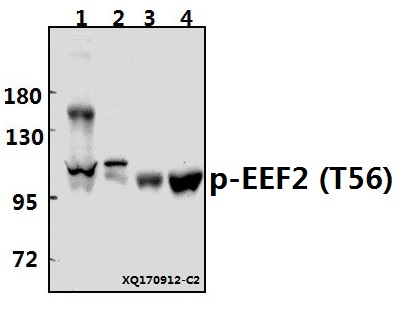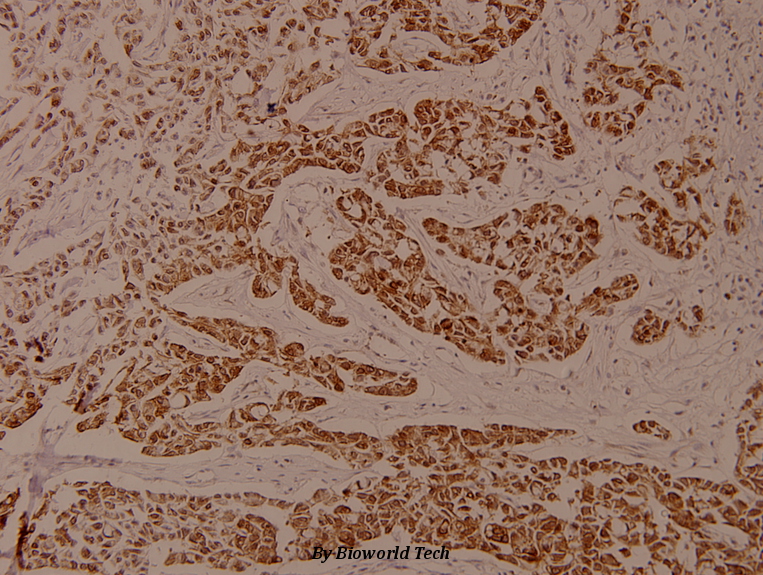Product Name :
EEF2 (phospho-T56) polyclonal antibody Background :
Two elongation factors (EF) EF-Tu and EF-2 participate in the elongation phase during protein biosynthesis on the ribosome and their functional cycles depend on GTP binding and its hydrolysis. EF-Tu (also designated mitochondrial precursor p43) and EF-2 are multidomain GTPases with essential functions in translation, and they both bind to the same site on the ribosome where their low intrinsic GTPase activities are strongly stimulated. EF-Tu plays a central role in the fast and accurate delivery of aminoacyl-tRNAs to the translating ribosome. In addition, EF-Tu protects the aminoester bond against hydrolysis until a correct match between the codon on mRNA and the anticodon on tRNA can be achieved. EF-2 supports the translocation of tRNAs and of mRNAs on the ribosome so that a new codon can be exposed for decoding. Product :
Rabbit IgG, 1mg/ml in PBS with 0.02% sodium azide, 50% glycerol, pH7.2 Storage&Stability :
Store at 4°C short term. Aliquot and store at -20°C long term. Avoid freeze-thaw cycles. Specificity :
p-EEF2 (T56) polyclonal antibody detects endogenous levels of EF-2 protein when phosphorylated at Thr56. Immunogen :
Synthetic peptide, corresponding to amino acids 20-70 of Human eEF2. Conjugate :
Unconjugated Modification :
Phosphorylation
EEF2 (phospho-T56) polyclonal antibody Background :
Two elongation factors (EF) EF-Tu and EF-2 participate in the elongation phase during protein biosynthesis on the ribosome and their functional cycles depend on GTP binding and its hydrolysis. EF-Tu (also designated mitochondrial precursor p43) and EF-2 are multidomain GTPases with essential functions in translation, and they both bind to the same site on the ribosome where their low intrinsic GTPase activities are strongly stimulated. EF-Tu plays a central role in the fast and accurate delivery of aminoacyl-tRNAs to the translating ribosome. In addition, EF-Tu protects the aminoester bond against hydrolysis until a correct match between the codon on mRNA and the anticodon on tRNA can be achieved. EF-2 supports the translocation of tRNAs and of mRNAs on the ribosome so that a new codon can be exposed for decoding. Product :
Rabbit IgG, 1mg/ml in PBS with 0.02% sodium azide, 50% glycerol, pH7.2 Storage&Stability :
Store at 4°C short term. Aliquot and store at -20°C long term. Avoid freeze-thaw cycles. Specificity :
p-EEF2 (T56) polyclonal antibody detects endogenous levels of EF-2 protein when phosphorylated at Thr56. Immunogen :
Synthetic peptide, corresponding to amino acids 20-70 of Human eEF2. Conjugate :
Unconjugated Modification :
Phosphorylation
-
 Western blot (WB) analysis of p-EEF2 (T56) pAb at 1:500 dilution Lane1:K562 whole cell lysate(40ug) Lane2:HEK293T whole cell lysate(10ug) Lane3:The Liver tissue lysate of Rat(40ug) Lane4:The Liver tissue lysate of Mouse(40ug)
Western blot (WB) analysis of p-EEF2 (T56) pAb at 1:500 dilution Lane1:K562 whole cell lysate(40ug) Lane2:HEK293T whole cell lysate(10ug) Lane3:The Liver tissue lysate of Rat(40ug) Lane4:The Liver tissue lysate of Mouse(40ug) -
 Immunohistochemistry (IHC) analyzes of p-EEF2 (T56) pAb in paraffin-embedded human breast carcinoma tissue at 1:100.
Immunohistochemistry (IHC) analyzes of p-EEF2 (T56) pAb in paraffin-embedded human breast carcinoma tissue at 1:100.
Bioworld Biotech only provide peptides for our antibodies and do not provide additional peptide customization services.
Price/Size :
USD 368/1mg/vial
Tips:
For phospho antibody, we provide phospho peptide(0.5mg) and non-phospho peptide(0.5mg).Describe :
Blocking peptides are peptides that bind specifically to the target antibody and block antibody binding. These peptide usually contains the epitope recognized by the antibody. Antibodies bound to the blocking peptide no longer bind to the epitope on the target protein. This mechanism is useful when non-specific binding is an issue, for example, in Western blotting (WB) and Immunohistochemistry (IHC). By comparing the staining from the blocked antibody versus the antibody alone, one can see which staining is specific; Specific binding will be absent from the western blot or IHC performed with the neutralized antibody.Formula:
Synthetic peptide was lyophilized with 100% acetonitrile and is supplied as a powder. Reconstitute with 0.1 ml DI water for a final concentration of 10 mg/ml.The purity is >90%,tested by HPLC and MS.
Storage:
The freeze-dried powder is more stable. For short time at 2-8°C. For long term storage store at -20°C.
Note :
This product is for research use only (RUO only). Not for use in diagnostic or therapeutic procedures.
 EEF2 (phospho-T56) polyclonal antibody
EEF2 (phospho-T56) polyclonal antibody  Datasheet
Datasheet COA
COA MSDS
MSDS SHIP
SHIP